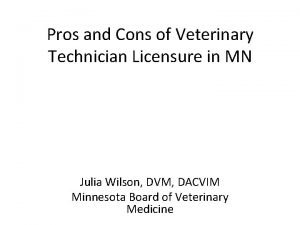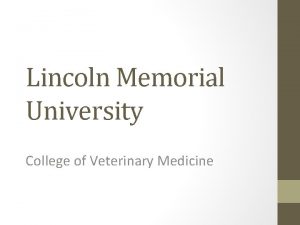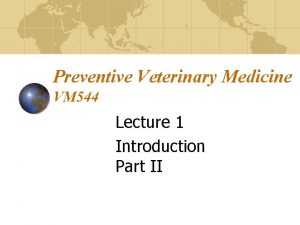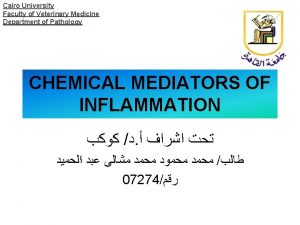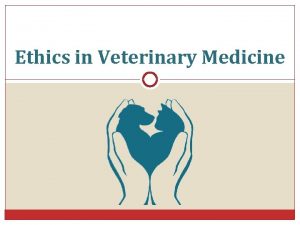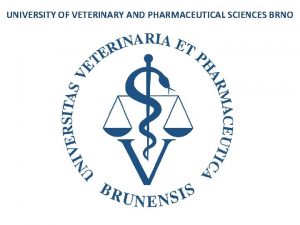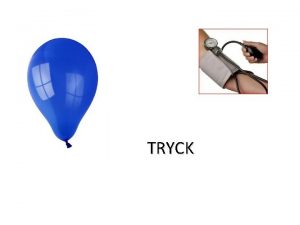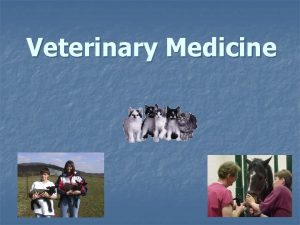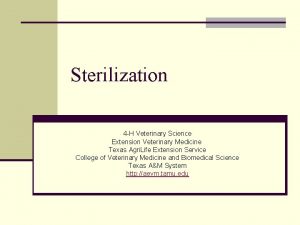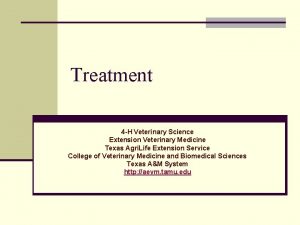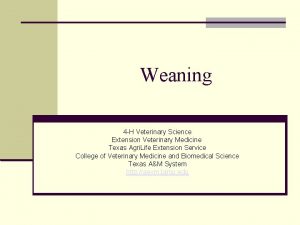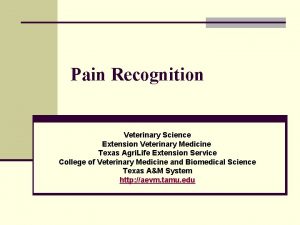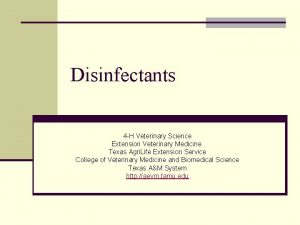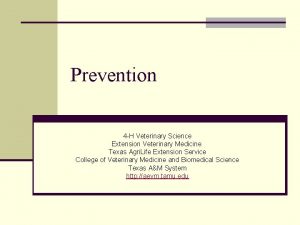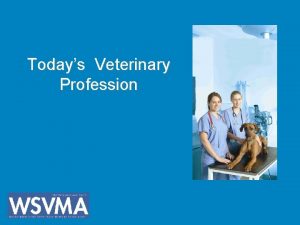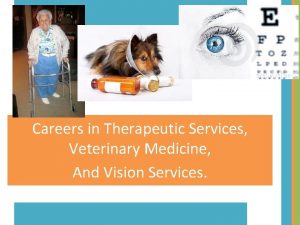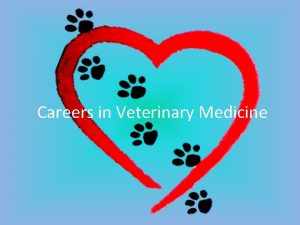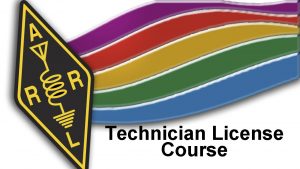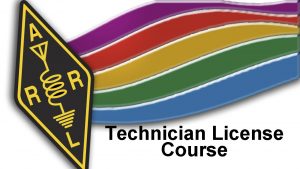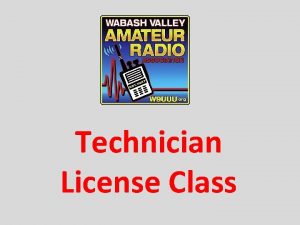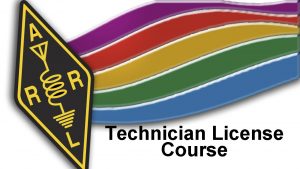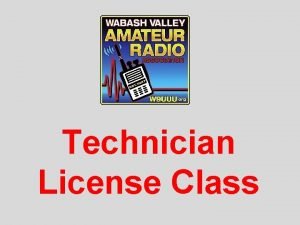VETERINARY MEDICINE VETERINARY TECHNICIAN CAREERS 2021 Prepared for


















- Slides: 18

VETERINARY MEDICINE & VETERINARY TECHNICIAN CAREERS 2021 Prepared for Missy Cruz South Houston HS - Health Sciences Dept Prepared by Theresa Garcia Pets 4 People Feb 2021

Veterinarians and Veterinary Technicians specialize in the care of animals across a wide variety of species. They can work in veterinary offices, private practices, educational institutions, non-profit organizations and as a part of government agencies. They can perform/assist in surgical procedures, diagnose injuries or illnesses and assess the overall health of pets, farm animals and zoo animals.

veterinarian-client-patient relationship The veterinarian-client-patient relationship (VCPR) is the basis for interaction among veterinarians, their clients, and their patients and is critical to the health of animals.

Veterinary Practices: Privately owned vs Corporate ownership A corporate veterinary clinic is a practice that is owned and operated by a company. This is a different business model than traditional private practice, where a clinic is owned and operated by an individual veterinarian or a small group of veterinarians. As a private practice, we have the freedom to participate and give back to our local community, rather than having to contribute to sponsorships with a corporate interest that might not resonate with our values and hearts

The corporatization of veterinary medicine Corporation's involvement in historically entrepreneurial profession generates uncertainty Once upon a time…. . Corporate-owned veterinary practices have been around for roughly 30 years, ever since VCA Animal Hospitals acquired its first independently owned companion animal clinic in 1987. Currently, VCA operates over 800 clinics throughout North America. The success of VCA led to the formation of several national and regional chains, such as Banfield Pet Hospital, Blue. Pearl, and Heartland Veterinary Partners. Analysts put the number of corporate veterinary practice groups at now just over 40. Private equity firms, which see companion animal practice as a relatively safe investment offering respectable returns, are funding many of the acquisitions by corporate groups. Depending on the source, the number of veterinary practices in the U. S. ranges from 28, 000 to 32, 000, according to the 2017 AVMA Report on the Market for Veterinary Services. Brakke Consulting tracks corporate purchases of veterinary clinics and estimates that about 3, 500 are company-owned. John Volk, an analyst with Brakke, says corporations own about 10 percent of general companion animal practices and 40 to 50 percent of referral practices.

Here's a list of AVMA-Recognized Veterinary Specialty Organizations™ with very brief descriptions of what these specially trained veterinarians do. For more information about the specialties, click the link to go to the website of the specialty college responsible for certifying veterinarians in that specialty: Anesthesia and analgesia: veterinary specialists who are experts at assessment and mitigation of anesthetic risks, delivery of anesthetic and analgesic drugs, maintaining and monitoring physiologic well-being of the anesthetized patient, and providing the highest levels of perioperative patient care including pain management. Animal welfare: veterinary specialists with advanced training and experience in animal welfare. Behavior: veterinary specialists with advanced knowledge of animal behavior and behavior modification. Dentistry: veterinarians who specialize in the diagnosis and treatment of dental, oral, and maxillofacial diseases. Dermatology: veterinary specialists with advanced training and expertise in the diagnosis and treatment of allergy and diseases affecting the skin, ears, nails and/or hooves of animals. Emergency and critical care: veterinary specialists who work exclusively in both emergency rooms and intensive care units to care for animals that are often the "sickest of the sick". Internal medicine, which includes specialties of: • Cardiology: veterinary specialists who diagnose and treat conditions of the heart and circulatory system. • Internal Medicine: veterinary specialists trained to manage complex medical problems or disease conditions affecting multiple body systems. • Neurology: veterinary specialists who diagnose and treat diseases of the brain, spinal cord, and other parts

Laboratory animal medicine: veterinary specialists working in research or in practice, making sure laboratory animal species (rabbits, rats, mice, etc. ) receive proper care. Microbiology: Veterinarians who specialize in research, teaching, and/or diagnosis of infectious diseases. Specialties include: Virology – Immunology - Bacteriology/Mycology - Parasitology Veterinary nutrition: veterinary specialists dedicated to the research and the clinical application of nutrition and diet in health and disease. Ophthalmology: veterinary specialists who study diseases and conditions of the eye. Pathology: veterinary specialists practicing microscopic and clinical pathology to protect and improve animal, human and environmental health to benefit society. Pharmacology: veterinary specialists who study how medications/drugs affect animals. Poultry: veterinary specialists who work with chickens, turkeys, ducks, and other fowl, usually in food production settings. Preventive medicine: veterinary specialists improving animal, human, and environmental health through surveillance, recognition, outbreak investigation, and management of animal diseases; prevention and control of zoonotic diseases and foodborne illnesses; reduction of bites, injuries and other environmental and occupational human health hazards related to animals; promotion of food protection and wholesomeness; and promotion of humane animal care and the use of animals in animal-facilitated therapy. Radiology: veterinary specialists who focus on the study of x-ray, ultrasound, computed tomography (CT), magnetic resonance imaging (MRI), and other imaging procedures that allow us to see "inside" an animal's body; radiation oncologists specialize in the treatment of cancer patients using radiotherapy.

Sports medicine and rehabilitation: veterinary specialists who focus on returning animals to normal function after injury, lameness, illness, or surgery. Surgery: veterinarians who specialize in performing surgery. A certified surgeon will be certified in either small animal or large animal surgery. Within these groups, many surgeons will focus their work in a sub-category, but they are not limited to them: • Orthopedics: these surgeons focus on the bones, joints, ligaments, muscles, and tendons that make up the body's skeletal system. • Soft Tissue surgery: these surgeons focus on the internal organs and non-bone tissues of the body. • Neurosurgery: these surgeons focus on the brain, spinal cord and other parts of the nervous system. Theriogenology: veterinary specialists who diagnosis and manage conditions affecting animal reproduction. Toxicology: veterinary specialists who study the effects of poisons and other toxic products on the body (and how to treat animals affected by these toxins). Veterinary practitioners: veterinary specialists with extensive and advanced training in specific animal species and practice areas: Avian Practice (birds) + Equine Practice (horses) + Beef Cattle Practice (cattle raised for meat) • Feline Practice (cats) + Canine and Feline Practice (dogs and cats) • Exotic Companion Mammal Practice (ferrets, rabbits, mice, rats and other small mammals often kept as pets) • Food Animal Practice (cattle, sheep, goats, and pigs) + Dairy Practice (cows that produce milk) + Swine Health Management (pigs) • Reptile and Amphibian Practice (snakes, lizards, salamanders, turtles, etc. ) • Shelter Practice (diverse population of animals in a shelter setting) Zoological medicine: veterinary specialists who work with zoo collection animals, free-living wildlife, aquatic

VETERINARY TECHNICIAN CAREERS When you graduate from vet tech school, the most obvious option is to begin working in a local veterinary clinic. Regardless of whether you want to work with small animal or large animal patients, many vet techs envision themselves in general veterinary practice, providing a combination of wellness, medical, and surgical care. A license to work as a veterinary technician is not mandatory however it is illegal in Texas to use the term “LVT” or call themselves an LVT without a license issued from the Texas Board of Veterinary Medical Examiners.




DVM: Doctor of Veterinary Medicine or Ph. D in Veterinary Medicine > these degrees can include a specialized area of interest Coursework may include etiology, biology, ecology, anatomy & physiology, zoology, wildlife, animal science, psychology, and statistics. veterinary school is a four-year degree program following undergraduate Bachelor's degree level education (a total of 7 to 9 years: 3 to 5 years undergraduate plus 4 years of veterinary school). CVA: Certified Veterinary Assistant > A veterinary technician requires less education. A typical degree program completed by a veterinary technician lasts for 2 -4 years. ACAAB: Associate Certified Applied Animal Behaviorist > Undergraduate and/or graduate coursework must include 30 semester credits in behavioral science courses including 9 semester credits in ethology, animal behavior and/or comparative psychology and 9 semester credits in animal learning, conditioning and or animal psychology CAAB: Certified Applied Animal Behaviorist >Educational and experiential requirements include a doctoral degree from an accredited college or university in a biological or behavioral science with an emphasis on animal behavior, including five years of professional experience, or a doctorate from an accredited college or university in veterinary medicine plus two years in a university-approved residency in animal behavior and three additional years of professional experience in applied animal behavior.

ADDITIONAL EDUCATION & LINKS AAT: Animal Assisted Therapist > Animals & Human Health certificate that requires one on-campus course and three online courses. The on-campus course is the capstone, which involves student presentations, group work, and interaction with animal therapy professionals. Applicants must have a bachelor’s degree or equivalent practical experience in animal assisted therapy. CAAP: Certificate in Animal Assisted Psychotherapy > The program is designed for mental health professionals and students with an interest in animal assisted interventions. The certificate program includes six online courses, which can be completed at the student's own pace. The program also offers a virtual classroom allowing students to network. The course is eligible for continuing education credit hours. Applicants must be students or have earned an advanced degree in the mental health field. Grooming or Kennel Professional: Dependent on your state there are no licensing requirements to be a professional groomer. However, in certain states, a freelance groomer with their own business will require their facility to hold a Pet Grooming Facility License or a regional certification. While freelance groomers themselves do not need this license, their facility will. Rescue, Shelter, Pet shop Professional: Dependent on the state, professionals need to obtain proper licensing and comply with the AWA (Animal Welfare Act) and PACFA (Pet Care Animal Facilities Act) AVMA: https: //www. avma. org/ Animal Career List: https: //www. thebalancecareers. com/animal-career-list 125603 Department of Agriculture: https: //www. usda. gov/ AWA reference guide: https: //www. nal. usda. gov/awic/animal-welfare-actquick-reference-guides

Criteria for Prospective Therapy Animals Working with your Pet Are YOU and your PET ready to work as Volunteers? 1) Are at least one year old at the time of evaluation, or What characteristics & requirements does your PET and YOU need to qualify? six months old for rabbits, guinea pigs, and rats. 2) Your pet must have lived in your home for at least six months, or one year for birds. 3) Pets must be reliably house trained. Waste collection devices are not permitted, except for flight suits for birds. 4) Pets must have a current MLV Rabies Vaccination. Rabbits, guinea pigs, rats, and birds are exempt from this requirement. 5) Pets applying for service or therapy animals may not be fed a raw meat diet. 6) Pets must have no history of aggression or seriously injuring either people or other animals. This includes animals who have been trained to aggressively protect and/or have been encouraged to bite, even if it is a component of dog sports. 7) Pets must demonstrate good basic obedience skills. Animals walking with a lead should walk on a loose leash, and respond reliably to commands such as “sit, ” “down, ” “stay, ” “come, ” and “leave it. ” 8) Welcome, not merely tolerate, interactions with strangers.

Behavioral training & different types of training Everyone wants a well-behaved dog. Seek out a training session thru your local pet store or animal hospital/rescue – get tips for starting off on the right foot, training an older or rescue dog/correcting problem behaviors. Learning how to train your dog will improve your life and hers, enhance the bond between you, and ensure her safety-and it can be a lot of fun. Dogs are usually eager to learn, and the key to success is good communication. Your dog needs to understand how you’d like her to behave and why it’s in her/his best interest to comply with your wishes. Dogs have lots of options when it comes to their education. Some will learn basic etiquette to spend time with a family while others may learn skills to perform search and rescue work. There are many different types of training for dogs depending what their needs are. BEHAVIORAL TRAINING & DIFFERENT TYPES OF TRAINING

ANIMAL INDUSTRY OPPORTUNITIES ARE LIMITLESS Key Questions & Discussion • Describe college path and training required. • What does a typical day at work look like? • Describe differences and similarities of training to treat animals vs. humans. • How much did college cost? • Time to complete all college requirements. • Salary range • Describe a few common medical procedures. • Describe the difference of care between household pets and livestock.

THANK YOU FROM PETS 4 PEOPLE. ORG IN COLORADO > History & Links Creator of Denver’s 1 st live stream “Pet Cams” offered to the public 1998 at Denver’s 1 st Live Animal Fundraiser: Pet Fair-Bone-Nanza 2000: https: //www. blacktie-colorado. com/photos/photoevent. cfm? id=310 Creator of Denver’s 1 st professional Haunted House venue: The Nation’s only Haunted Vet Hospital & Maze of Terror” 2013 -2015 https: //www. youtube. com/watch? v=TBb. Kb. OBcff. Q Creator of Colorado’s 1 st Holistic Pet Center/Aquatic Veterinary Hospital 2014 – 2017 https: //www. denverpost. com/2014/02/28/denver-fish-vetknown-as-dr-koi-keeps-patients-feeling-fin/#ixzz 2 uf. Vhu. AFo Additional links: https: //source. colostate. edu/patron-saint-of-pets-celebrates-more-than -5 -decades-as-veterinarian/ https: //www. denverpost. com/athome/ci_23219102/denvers-patronsaint-pets-82 -headlines-new-vet
 Vet tech pros and cons
Vet tech pros and cons Sports medicine careers
Sports medicine careers Faculty of veterinary medicine cairo university
Faculty of veterinary medicine cairo university Conus arteriosus
Conus arteriosus Canvas ucdavis
Canvas ucdavis Lincoln memorial university college of veterinary medicine
Lincoln memorial university college of veterinary medicine Vm 544
Vm 544 Cairo university faculty of veterinary medicine
Cairo university faculty of veterinary medicine Faculty of veterinary medicine cairo university logo
Faculty of veterinary medicine cairo university logo Ethics in veterinary medicine
Ethics in veterinary medicine Paten brno
Paten brno Kraft per area
Kraft per area Presentera för publik crossboss
Presentera för publik crossboss Rbk fuktmätning
Rbk fuktmätning Vad är densitet
Vad är densitet Elektronik för barn
Elektronik för barn Kung dog 1611
Kung dog 1611 Tack för att ni har lyssnat
Tack för att ni har lyssnat Smärtskolan kunskap för livet
Smärtskolan kunskap för livet
